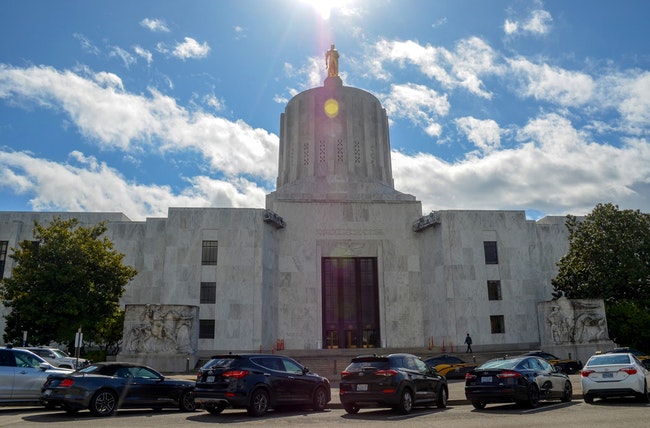
SALEM – Higher wages are driving up Oregon’s projected tax revenue, but most middle-class workers won’t feel the benefits of larger paychecks over the next year because of inflation, state economists said Wednesday.
A quarterly economic forecast from the state Department of Administrative Services predicted that Oregon will recover from a pandemic-induced recession much more quickly than it did from the Great Recession. Higher wages, especially for low-income workers, are making up for expiring federal aid, according to the forecast.
But labor shortages and supply chain disruptions are driving prices up and eating into families’ budgets. And the Portland area, which contains roughly half the state’s population and jobs, is lagging the rest of Oregon in recovering from the pandemic.
With Oregonians earning more money, the state is collecting more income tax revenue than expected when the current budget cycle started in July. Oregonians who filed taxes in 2020 and 2021 are already expected to receive $1.9 billion next year in “kicker” tax credits triggered when the state collects more in taxes than it budgeted, with a credit of $420 for the median taxpayer. Forecasters now predict the state will refund $558 million in 2024 as well.
A rosy forecast for state government revenue presented to Oregon’s House and Senate finance committees came as other legislative committees heard dire warnings about a coming wave of evictions as tenants struggle to afford rent.
“It’s still really quite something to grasp that we’re in a situation with a revenue forecast where we’re seeing additional revenue over what had been forecast; things look really rosy that way,” said Rep. Nancy Nathanson, a Eugene Democrat who chairs the House committee. “There are other legislative committees hearing very troubled information about people who are in danger of losing their homes and other types of challenges for some of Oregon’s businesses and individuals. How can this be true at the same time?”
Wage gap narrows, inflation hits
Across the board, wages adjusted for inflation are up about 8% since the start of the pandemic in Oregon in March 2020. Workers making less than $20 an hour saw the most significant increases, while those making more still saw raises but they didn’t keep pace with inflation.
Normally, inflation would hit low-income workers the hardest, state economist Josh Lehner said. If you’re living paycheck to paycheck, higher prices mean those paychecks don’t go as far. Workers who earn more and don’t routinely spend everything they earn might need to decrease the amount they save, but they also stand to benefit from rising returns on their investments.
On average, low-income workers in Oregon are increasing their standard of living, while middle-income workers are beginning to struggle with the erosive effects of inflation.
“Basically, if you’re more than $20 an hour you’re seeing wage gains, but not as fast as inflation, so you’re seeing some real wage declines,” Lehner said. “From a broader societal economic perspective, maybe some reduction in wage inequality would have some broader benefits, even in a high inflation environment, but of course, when the typical worker seeing real wage declines, and you’re paying more at the pump, more at the store, that really starts to hit your budget.”
For the most part, economists expect higher prices to begin to subside as supply catches up to demand for products that were manufactured at much slower rates than normal during the pandemic. For instance, used car prices are up roughly 40% since the start of the pandemic because of a shortage of semiconductor chips needed for new cars, but those prices are expected to decrease as manufacturing ramps up.
Other areas, including rising costs to buy or rent homes, are more concerning, state economist Mark McMullen said.
“We’re seeing a tremendous amount of inflation there, but unlike what we’re seeing in terms of a lot of the other durable goods, we can’t expect a huge supply response that’s going to come and save the day and bring down house prices and bring down rents going forward,” he said. “So that’s something where there may be a role for policymakers.”
If inflation doesn’t cool, Oregon could be back in a recession by 2023, under an alternative forecast. That scenario predicts that more than 130,000 people would lose their jobs and the state wouldn’t fully recover until 2028.
Rural recovery outpaces Portland
Counties in eastern Oregon far outpaced the rest of the state and most of the country in income growth over the past year, mostly because many families there had low incomes, McMullen said. Stimulus checks, changes to child tax credits that resulted in guardians receiving monthly payments and increased federal unemployment payments were more meaningful in counties with lower average incomes.
Portland, meanwhile, is trailing the rest of the state in recovery. Other large metros around the country are also recovering slower from the pandemic than rural and suburban areas, which the economists said demonstrates a difference between the pandemic-induced downturn and the Great Recession.
After that recession, metro areas led the rest of the country. But cities thrive on crowds and in-person activities, and people aren’t yet flocking to cities for shopping and events.
“What’s impacting all large urban areas is the lack of in person activity,” Lehner said. “People aren’t going out to shows, aren’t going out to eat quite as much in the urban cores as they are in the suburbs and in our rural communities.”
Lehner and McMullen wrote in their report that they expect Portland will remain an attractive place to live and will recover fully, but it’s unclear whether the city will regain its perch as one of the most attractive destinations for workers.
What to do with more money
Legislative leaders and Gov. Kate Brown responded to the forecast with different suggestions for how to use the forecasted roughly $700 million in additional revenue for the state’s current two-year budget cycle.
In a statement, Brown said the state should use its windfall to assist people of color, who she said have been disproportionately impacted by the pandemic. She asked a subgroup of the state’s racial justice council to develop budget proposals aimed at getting people back to work and improving career opportunities, she said.
“We must continue to center equity in our recovery efforts to ensure that the communities disproportionately impacted by the pandemic due to historic disparities – Oregon’s Black, Indigenous, Latino, Latina, Latinx, Asian, Pacific Islander, Tribal and people of color – benefit equitably from Oregon’s strong economic recovery,” Brown said.
House Speaker Tina Kotek, D-Portland, said in her own statement that the state must invest new revenue in communities that felt the brunt of the economic downturn. She cited rent assistance as one use for state funds.
“The revenue growth in today’s forecast does not change the fact that too many Oregonians are still facing a challenging recovery from the pandemic recession,” Kotek said.
Meanwhile, House Minority Leader Christine Drazan, R-Canby, and Senate President Peter Courtney, D-Salem, urged caution in spending.
“Oregon continues to see robust growth,” Courtney said. “We did not expect this. Apparently, we’ve recovered quickly from the economic downturn. Economists don’t seem to know why. I think we should continue to be vigilant and frugal about the money we have.”
And Senate Republicans used the windfall to call for tax breaks. Sen. Lynn Findley, R-Vale, said he’ll reintroduce legislation to reduce income taxes, including exempting prescription drugs, diapers and feminine hygiene products from the state’s corporate activity tax.
Oregon doesn’t have a state sales tax, but the corporate activity tax charges businesses a tax on their gross receipts. Because businesses can pass those costs on to consumers, critics of the tax refer to it as a hidden sales tax.
“The state continues to get bigger budgets, but working families are struggling to make ends meet because of inflation,” Findley said. “Oregon Democrats have refused every opportunity to give working families a break.”
Oregon Capital Chronicle is part of States Newsroom, a network of news bureaus supported by grants and a coalition of donors as a 501c(3) public charity. Oregon Capital Chronicle maintains editorial independence. Contact Editor Les Zaitz for questions: [email protected]. Follow Oregon Capital Chronicle on Facebook and Twitter.
NEWS TIP? Please send an email to [email protected] for our reporters to consider.




